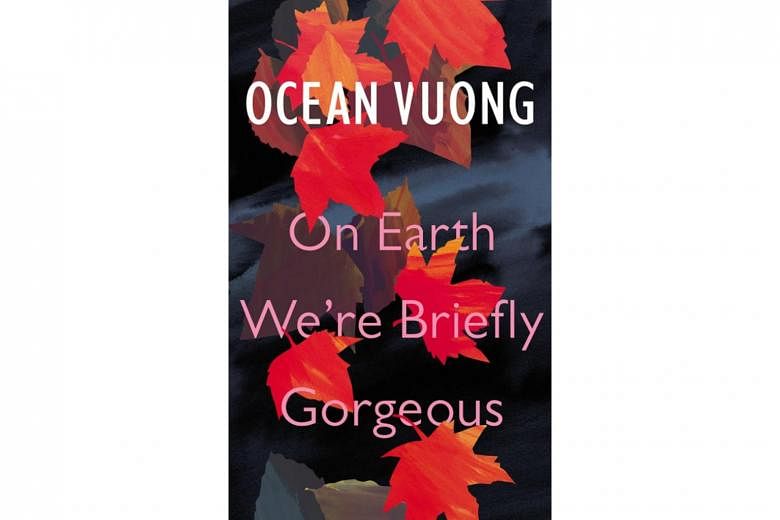FICTION
ON EARTH WE'RE BRIEFLY GORGEOUS
By Ocean Vuong
Jonathan Cape/ Paperback/ 246 pages/ $26.95/ Books Kinokuniya
4 stars
A man writes his mother a letter that she cannot read. It is her story, one that started in a war in another country; it is also his story, that of a child growing up haunted by a war he did not live through.
She is illiterate; he is struggling with whether language can do anything for wounds that are beyond words. "I'm breaking us apart again," he tells her in the letter, "so that I might carry us somewhere else." He is not sure where.
The debut novel of Vietnam-born American writer Ocean Vuong is a work of staggering, extraordinary beauty.
The narrator Little Dog - whose circumstances are much like Vuong's own - is trying to parse the unspoken traumas of his mother and grandmother, who moved to the United States from a Vietnam still in shambles years after the war.
His grandmother Lan was a sex worker who served American soldiers during the war; her mixed-race daughter Rose endured other children trying to "get the white off" her skin with a spoon.
Little Dog grows up in a household of women with post-traumatic stress disorder (PTSD). His grandmother thinks fireworks are mortars. His mother asks him to check if the label on a dress says it is fireproof before buying it.
She works at a nail salon, needs him to translate English for her and abuses him. "I read that parents suffering from PTSD are more likely to hit their children," he reasons. "Perhaps to lay hands on your child is to prepare him for war."
Little Dog tries to come to terms with all this in his letter and also to tell her the story of his first love: Trevor, the reckless, hyper-masculine grandson of the owner of the tobacco farm where Little Dog works as a teenager, with whom he has a fumbling yet tender relationship marred by denial and addiction.
Vuong made his name as a poet - he won the prestigious T. S. Eliot Prize in 2017 for his debut collection Night Sky With Exit Wounds - and much of that bleeds into his novel. Nearly every phrase achieves something of beauty. In fact it runs the risk of being too beautiful, of taking pain and packaging it into pithy phrases for easy re-quoting.
Vuong is wary of this tendency and repeatedly questions it: What is the use of beauty in the face of violence?
For all that the novel drips with the gorgeousness of its title, there is a moment involving the loss of an unborn child, a metaphor so harrowing in its simplicity that this reviewer has not been able to forget it since.
Beauty, Vuong concludes, can be also be a form of survival. "I want to insist that our being alive is beautiful enough to be worthy of replication," says Little Dog. "And so what? So what if all I ever made of my life was more of it?"
He and his mother were not born from war, he decides, but from beauty. "Let no one mistake us for the fruit of violence - but rather that violence, having passed through the fruit, failed to spoil it."
If you liked this, read: The Refugees by Viet Thanh Nguyen (Little, Brown, 2017, $18.95, Books Kinokuniya), a short story collection by the Pulitzer Prize-winning writer about the experiences of Vietnam War refugees, from a ghost-writer visited by her brother's ghost to an elderly man with Alzheimer's who begins to call his wife by another name.


